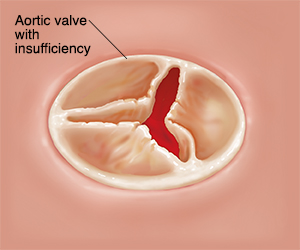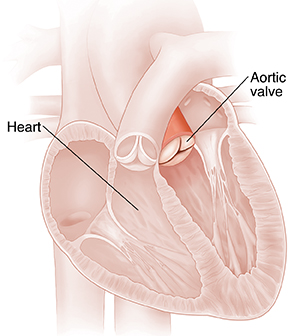Heart Valve Problems: Aortic Insufficiency
Heart Valve Problems: Aortic Insufficiency
Aortic insufficiency means your aortic valve has problems closing. Blood leaks back through the valve. Extra blood may cause the ventricle to stretch. A stretched ventricle doesn’t squeeze as well. In time, the heart won’t move blood the way it should.
Closed aortic valve with insufficiency (viewed from above). The valve does not close all the way, allowing blood to leak backward. |
Cross section of heart showing aortic valve with insufficiency. |
Possible causes
People with aortic insufficiency can be born with the problem, and often feel no symptoms. Or, the aortic valve may have been damaged by rheumatic fever or a heart infection. It can also occur after a cardiac event, such as a heart attack.
Treating aortic insufficiency
Your doctor may prescribe medicines. These can make it easier for the heart to move your blood. To treat severe insufficiency, heart valve surgery may be needed, especially if you develop symptoms.
Updated:
September 08, 2018
Sources:
Clinical manifestations and diagnosis of chronic aortic regurgitation in adults, Up To Date, Hamirani, YS., Acute Aortic Regurgitation, Circulation (2012); 126; 1121-1126
Reviewed By:
Fetterman, Anne, RN, BSN,Gandelman, Glenn, MD, MPH,Image reviewed by StayWell medical illustration team.

